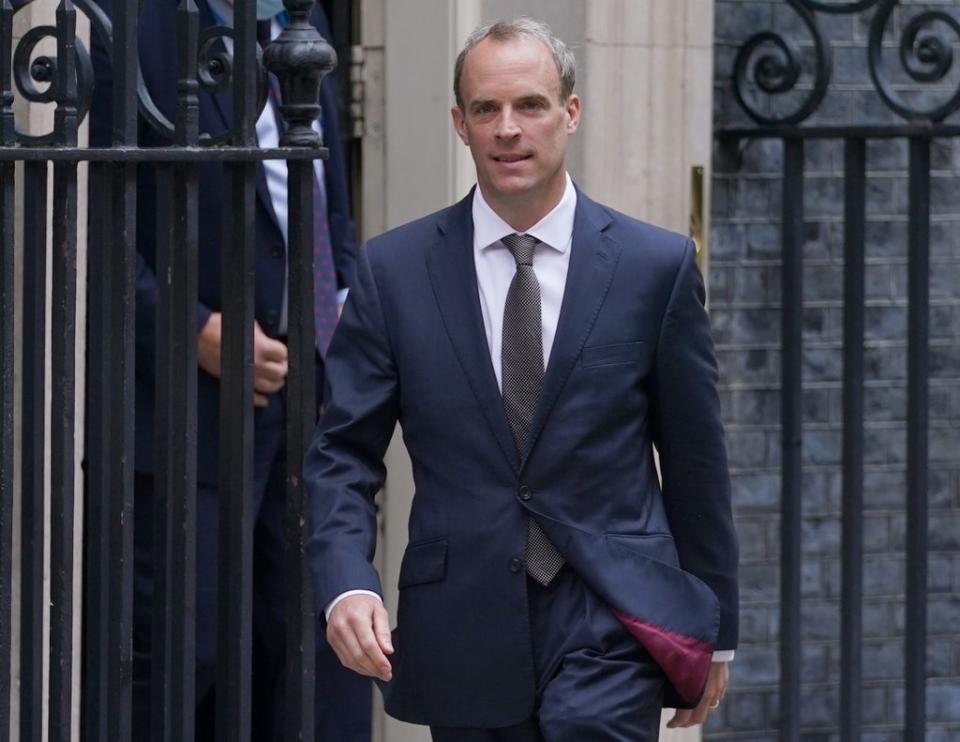Raab threat to ‘correct’ court judgments is ‘deeply troubling’, warn legal experts

Legal experts have responded with alarm to suggestions from justice secretary Dominic Raab that he will legislate to “correct” court judgments in human rights cases that go against the government.
The former head of the government’s legal service, Jonathan Jones, branded the deputy prime minister’s proposals “muddled”, while a professor of public law at Cambridge University said they were “deeply troubling” and that they threatened to undermine basic standards of good governance.
Mr Raab announced plans to “overhaul” the Human Rights Act to reduce the influence of the European Court of Human Rights (ECHR) at the Conservative Party conference in Manchester earlier this month.
In an interview with the Sunday Telegraph, he said that he was devising a mechanism to allow ministers to introduce ad hoc legislation to “correct” court judgments, whether passed by the ECHR in Strasbourg or by UK judges, which he regards as creating new law through “judicial legislation” rather than the decisions of elected politicians.
Watch: Dominic Raab attacks 'nonsense' of Human Rights Act
“We will get into the habit of legislating on a more periodic basis and thinking about the mechanism for that,” he said. “Where there have been judgments that – albeit properly and duly delivered by the courts – we think are wrong, the right thing is for parliament to legislate to correct them.”
Mr Raab said it was wrong for the European judges to “dictate” to the UK on how its armed forces, police, welfare system and health service should operate.
“We want the Supreme Court to have a last word on interpreting the laws of the land, not the Strasbourg court,” he said.
“We also want to protect and preserve the prerogatives of parliament from being whittled away by judicial legislation, abroad or indeed at home.”
Human rights lawyer Jessica Simor QC, of Matrix Chambers, said that Mr Raab was peddling a “false narrative” that foreign judges were ruling over the UK court system, when in fact the Human Rights Act was introduced specifically to ensure that British people were able to have their rights upheld in a domestic court rather than having to go to the ECHR.
Watering down its provisions would simply mean more complaints going to Strasbourg and more rulings against the UK, unless the government intended to pull Britain out of the European Convention on Human Rights altogether, which would be “a step into a dark place for this country and the world”, warned Ms Simor.
Mr Jones – who quit as the government’s top lawyer in 2020 in protest at Boris Johnson’s plans to breach international law in the row over the post-Brexit Irish border – said there was “lots of muddle” in Mr Raab’s proposals.
As parliament is already able to legislate to correct flaws in the law, it appeared Mr Raab was trying to use a new mechanism to allow ministers to take this step without obtaining MPs’ approval, he said.
“We’ve had (Brexit minister) Lord Frost proposing a ‘tailored mechanism’ for accelerating changes to retained EU law,” said Mr Jones.
“Now Mr Raab suggests a mechanism for ‘correcting’ court judgments. What can such mechanisms mean other than more hasty policy, less scrutiny, a reduced role for parliament?”
Cambridge professor of public law Mark Elliott pointed to a recent Supreme Court ruling, saying that allowing a minister to overrule a decision of the judiciary simply because he did not agree with it would cut across “principles that are fundamental components of the rule of law”.
Mr Raab appeared to be suggesting changes that would give the government the power to correct court decisions through secondary legislation, which does not have to be subjected to scrutiny or votes in parliament.
“If that is what is in contemplation, then that is profoundly problematic,” said Prof Elliott. “Indeed it turns constitutional principle on its head.
“Ministerial power to do this would itself be deeply troubling. It would reassign a basic judicial role – interpreting the law – to ministers.
“Ultimately, this all strikes me as part of a project to enhance executive supremacy by treating courts, whether foreign or domestic, as unwelcome interlopers.
“And yet all of this masquerades as an attempt to protect parliament. The reality of this executive power project, as we might call it, is that it will be the executive that is the principal beneficiary of such changes, and the loser will be basic standards of good governance.”
Labour’s shadow justice secretary David Lammy accused Mr Raab of reviving long-standing Tory assaults on human rights legislation as a way of diverting attention from the dire state of the criminal justice system under his watch.
“Rape convictions are at historic lows and women are rapidly losing faith in the criminal justice system, while record backlogs have left the courts at breaking point,” said Mr Lammy.
“And yet the priority for Dominic Raab seems to be undermining vital human rights legislation that protects us all.
“Instead of trying to weaken the rule of law, the Tories need to set out how they plan to fix the chaos they have created in the justice system.”
Watch: Raab commits to ‘transforming’ the way the justice system treats women and girls
Read More
Where did Dominic Raab go on holiday?
Raab insists he won’t quit over failure to make Afghan call on holiday
Dominic Raab may keep his job today – but for how much longer?

 Yahoo News
Yahoo News 